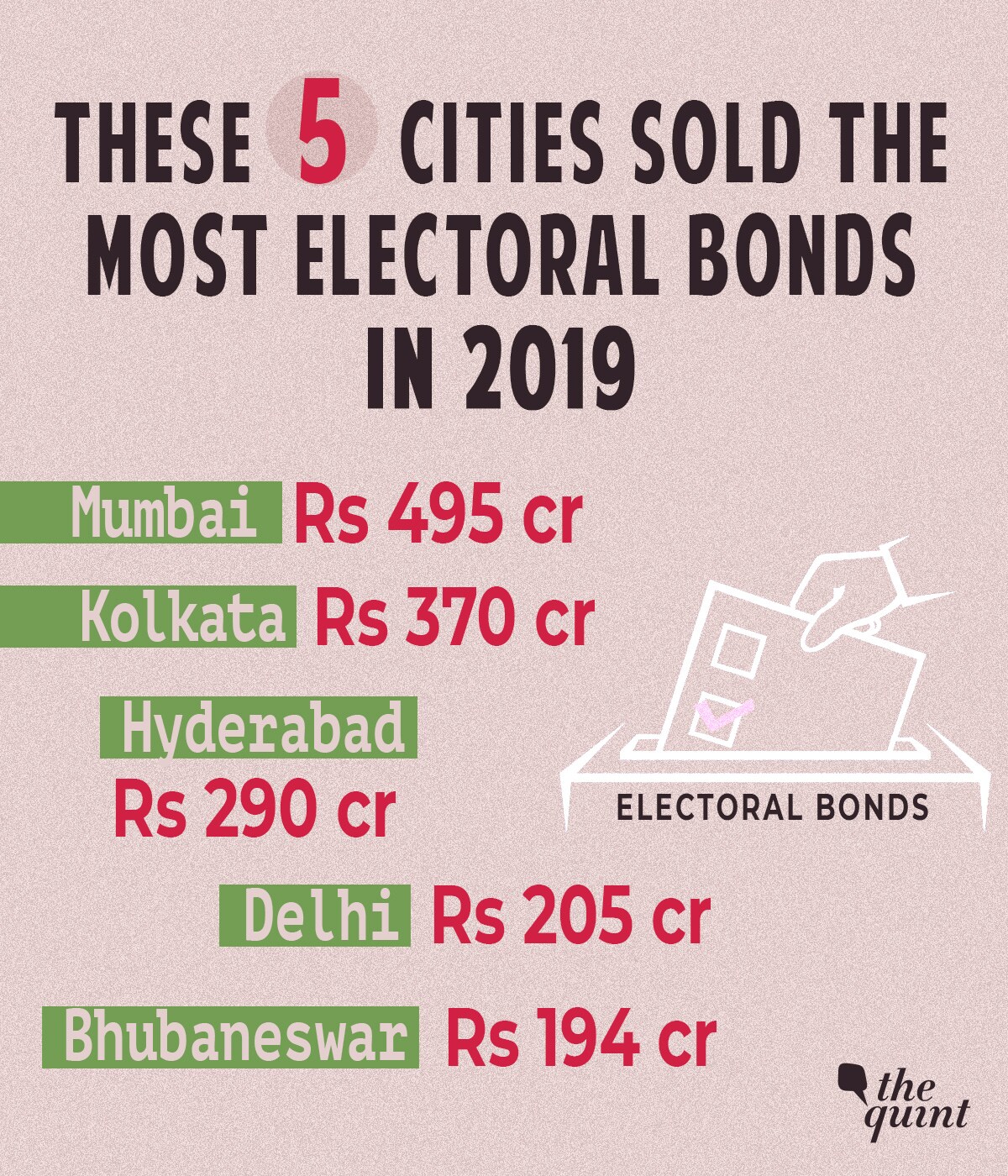
A whopping Rs 1,716 crores' worth of electoral bonds were sold in just two months, January and March 2019, by the State Bank of India. It seems that now the maximum amount of political donation is being made through electoral bonds, which the Election Commission of India (EC) itself termed a ‘retrograde step'.
In an affidavit filed in the Supreme Court on 25 March, the EC has said that electoral bonds will have serious repercussions on transparency in political funding.
In an RTI reply to Vihar Durve, accessed by The Quint, the SBI has said that in just two months in 2019, electoral bonds worth Rs 1716,05,14,000 were sold in 14 cities.
Whereas, over Rs 1,000 crore (Rs 1056,73,42,000 crore) worth of bonds were sold in 2018 (March, April, May, July, October and November).
Indeed, in an election year, one can expect political donations of this amount. But the worrisome part is that a huge amount of these donations are coming through the ‘anonymous and non-transparent' electoral bonds.
“Sale of electoral bonds worth over Rs 1,716 crores in just two months in contrast to Rs 1,056 crores in the full preceding year, unambiguously shows the impact this huge amount of money from completely unknown sources will have on the currently on-going election. Money, and that too from completely unknown sources, playing such a critical role in elections is not good for democracy in the country. Complete opacity in electoral financing therefore must be stopped.”Jagdeep Chhokar, Member, Association of Democratic Reform
In fact, the Modi government's claims that electoral bonds will keep the donors anonymous is also misleading. A series of articles by The Quint has exposed that the electoral bonds contain unique alphanumeric hidden numbers that are invisible to the naked eye, but visible under ultra-violet light. This unique number helps the Modi government to secretly track those making donations through bonds, and find out who they have donated to.

BJP Bagged 95% of Electoral Bonds in 2018
The 2017-18 annual audit report submitted by the BJP to the EC, revealed that the party received 95% of the total electoral bonds sold in March 2018. The RTI revealed that Rs 222 crores worth of electoral bonds were purchased in March 2018, of which BJP received Rs 210 crores' worth.
The electoral bonds data has also indicated that there is no demand for bonds of lower denominations like Rs 10 lakh or Rs 10,000. Though there is no concrete information on the type of purchasers, since SBI has refused to share this information, it is highly likely that most of the purchasers are corporates and the super-rich.
Why Electoral Bonds Are Dangerous
Threat to Democracy
In an affidavit filed in the SC on the petition challenging the electoral bonds scheme, the EC said,
“Any donation received by a political party through an electoral bond has been taken out from the ambit of reporting. It would be difficult to ascertain if the political parties received donations from government companies or foreign sources.”
The Modi government has claimed that electoral bonds were introduced to bring in transparency. But the former chief election commissioner OP Rawat's statement flies in the face of what the government has claimed.
“[Electoral bonds] rather increase opacity in the process of political donations. Electoral bonds are a big threat to democracy.”OP Rawat, former CEC
Who Benefits Most?
The former chief election commissioner SY Qureshi has said that electoral bonds scheme suits the ruling party to cover up quid pro quo between the government and the corporate sector.
“The real reason could be that they don't want return favours [quid pro quo] bestowed by the government [to corporates] in the form of contracts, licences, loans, etc to become public. Instead of making electoral funding more transparent, the process will become way more opaque, with information blacked out from the public.”SY Quraishi, former CEC
Encourages Routing Money Through Shell Companies
The EC has sharply criticised the introduction of the electoral bonds scheme, calling it a “retrograde step” that opens up the possibility of setting up shell companies through which black money can be used for political funding.
“The electoral bond system will create vulnerabilities in campaign finances (donations), making the democratic system vulnerable to manipulation. [It can be done] in a manner that money from unknown sources with dubious credentials, is routed through KYC, individuals or corporate identities, and finds its way into the electoral arena to vitiate the electoral process. That risk may remain. Even foreign money can trickle in.”OP Rawat, Former CEC
The SC is yet to decide on the petition seeking a stay on the sale of electoral bonds. The matter is listed for 2 April 2019.
Essential Business Intelligence, Continuous LIVE TV, Sharp Market Insights, Practical Personal Finance Advice and Latest Stories — On NDTV Profit.























